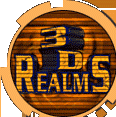






|
 |
Day 2 of 1up's Prey Coverage
Today is Day 2 of 1up.com's Week of Prey Coverage and they've published their latest piece. Today's piece is entitled "Say it Ain't So". This is an interview with 3D Realms' George Broussard talking about Prey.
The interview is wide ranging running from the early days of the project in 1995, through the change in development teams, up until now, how the tech has evolved, and lots of Prey specific questions. The interview also talks about a few things that aren't Prey specific such as what happened to the shareware game concept of distribution. Of course, since it's an interview with George, there's a few tidbits in there about Duke Nukem Forever, as well. Here's a few samples from the interview:
1UP: So I can start off: Just kind of take us back to 95 and just kind of tell us what was it like at Apogee/3D Realms back then. What was going on?
GB: Well, in 95 we were still working on Duke Nukem 3D, and so it was pretty hectic, just trying to get that game finished and basically trying to move from being a shareware developer doing smaller games to doing more large-scale games to try to get into the retail space. And then obviously, Duke went out and did really, really well in 96, and we were all really happy with the results from that. We started looking at wanting to expand a little bit and start another team, and that's kind of how we started building the Prey team.
1UP: So when you see what Human Head's doing with it now, does it really capture what you guys envisioned back then [in 1995]? What it's like comparing today's portals to 10 years ago's portals?
GB: It's pretty close; it's fundamentally the same stuff. We're all surprised that no one else really took that direction, because they're not really technically that hard to do. I know they got a lot of press from being like a whiz-bang cool thing back then, but technically, they just weren't too difficult to do, and there are some neat gameplay things you can do with it. But really, Human Head is pretty much just carrying on the torch and doing almost exactly what we were doing back then, and then expanding it into other areas with wall-walking and spirit walk and those kind of new things.
1UP: What kind of - so tell me about, like, what kind of feelings were you guys having when it actually started to come together, you're like: "Wow, we're going to bring Prey back"?
GB: It was a pretty fun time. We also were really close with the id guys through our past relationships, and that let us get the Doom 3 engine really, really early. I think we got it just a couple or three weeks after Raven did.
This interview also has an audio file of George, so you can listen to the interview and hear George speak it in addition to reading it on the page. All of this goodness is available on the 1up site here.
Posted by Joe Siegler at 12:54 PM
|
 |
 |
 |
 |
 |
The Future is Now: 5 Days of Prey Coverage
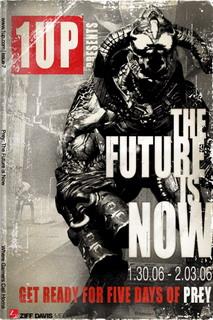 Prey coverage is starting to kick into high gear now, and with it comes this excellent series from Gaming news site 1Up. They will be having a Prey update daily this week, starting on January 30th and running through February 3rd. Each day will feature a different topic; the list of topics they're covering are: Prey coverage is starting to kick into high gear now, and with it comes this excellent series from Gaming news site 1Up. They will be having a Prey update daily this week, starting on January 30th and running through February 3rd. Each day will feature a different topic; the list of topics they're covering are:
- Monday: Backtracking through a decade of development.
- Tuesday: Straight from our George Broussard interview.
- Wednesday: Portal tech in the Doom 3 engine.
- Thursday: In-depth with the story of a reluctant hero.
- Friday: Exclusive hands-on with multiplayer Prey.
Today, the series kicks off with Part I, entitled Fell on Black Days: Backtracking through a decade of development. This first part deals with the history of the project, going all the way back to its earliest incarnation in 1995. It talks a lot about the start of the project, both with Tom Hall & Paul Schuytema's time as project leads, and the brief attempt at the project when Corinne Yu was here, leading up the the shelving of the project for a long time before Human Head came into the picture.
Additionally, each day they're including some sort of media to go with the day's article. The media with today's article is the Prey trailer from back in 1997. You're definitely going to want to keep an eye out on this series all week, you can do so at http://prey.1up.com.
Posted by Joe Siegler at 4:27 PM
|
 |
 |
 |
 |
 |
The Apogee Legacy #4 - Tom Hall
 Today our "Apogee Legacy" Interview series continues with its fourth edition, this time with Tom Hall, a core figure in the early days (and more) of our company. Tom was a founding member of id Software, working with them and us on Commander Keen & Wolfenstein 3D. He later joined Apogee, and was the project lead on Rise of the Triad, as well as having his hands in several titles doing work for them ranging from Hocus Pocus, Duke Nukem II, and Duke Nukem 3D. Additionally, he was the original project lead on Prey when it was in it's original incarnation. Today our "Apogee Legacy" Interview series continues with its fourth edition, this time with Tom Hall, a core figure in the early days (and more) of our company. Tom was a founding member of id Software, working with them and us on Commander Keen & Wolfenstein 3D. He later joined Apogee, and was the project lead on Rise of the Triad, as well as having his hands in several titles doing work for them ranging from Hocus Pocus, Duke Nukem II, and Duke Nukem 3D. Additionally, he was the original project lead on Prey when it was in it's original incarnation.
Since his time here, he's worked at Ion Storm, Monkeystone, Midway, & now KingsIsle. Tom has a huge connection with us and our past, so we're sure you're eager to hear what he has to say...
The Apogee Legacy
Past Pioneers of the Shareware Revolution
Issue #4 - Tom Hall
1) How did you first come in contact with Apogee?
Scott Miller had been trying to hire John Romero from his old days as a contributor to Uptime (an old monthly software magazine on disk), then he'd been getting fan mail from various people which he hung up. Then he noticed they were all coming from the same address! Both amused and angered, John wrote a strongly-worded letter back, only to find out it was Scott wanting to publish something.
Carmack and I had stayed up late one night making a funny joke demo of Super Mario Bros 3 and putting it on Romero's desk in the morning. This lead to a demo for Nintendo, which got to the head table but was rejected, so we decided to do our own thing. I went off to my office and in 15 minutes came up with the story of Commander Keen, which Scott was dying to publish, and so he did!
2) Was there a reason you decided to work with Apogee, say versus going on your own or working with another company?
Scott was so excited to publish us, and he sent us pizza money, which was so cool of him and a big convincer. Once Keen started selling, we realized we could live on that money. The rest is history.

|
|
Tom on his first day at Apogee
|
3) Looking back, was there anything Apogee could have done better, regarding the marketing and distribution of your game?
Well, the initial "Miller Model" of the buy one, get two was brilliant. But they needed to grow as we did. We had our computers networked before they did, putting the money back into the company, and we knew DOOM was gonna take off at least as well as Wolfenstein 3D did, and we didn't want that handled by a company with SneakerNet going on. But we totally owe our initial success to Scott believing in us.
4) Do you think your game was made better or worse by working with Apogee?
I think the Keens were made better by the trilogy thing. I think they were a little me-too during the development of early Prey. But working with Scott and George was a pleasure. Those guys love games.
5) Apogee had a policy of letting the designer or studio retain full intellectual property rights to their game. Nowadays, it's rare to find a publisher who allows this, especially if the publisher is providing the funding. Do you believe that it's best for the creator to retain IP rights? Why or why not?
That is awesome of them. Just wish I owned Keen. :-) It's kinda just a business property to the folks over there at id. Ah well. For some reason they want the ten thousands it is worth while the millions roll in.
5a) And if applicable, have you benefited from retaining ownership of your own IP?
N/A
5b) Do you think there'll ever be a sequel to your game(s)?
If I owned Keen, there sure would be. I don't consider that GBA game canon by any means. :-)
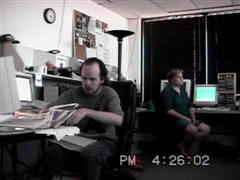
|
|
Searching for something in the offices where Rise of the Triad was developed. Mark Dochtermann is in the background.
|
6) Is there any story/incident that stands out as interesting during your time associated with Apogee?
Back in the development of Duke Nukem 3D, I walked into George's office and said, "When people get done with work, they are playing DOOM. Something is wrong if you have a new first-person shooter with deathmatch working, and everyone's not playing it." George took over the project and gave it a much higher fun factor. George MADE that game fun.
And the reception for the Dopefish was so strange. One guy became an ordained priest of the church of the Dopey Fish. It's just funny that a dumb fish from one level of Keen 4 is now an industry easter egg thing. Heh.
7) Apogee was an early pioneer in terms of teaming up with external designers and studios, and continues to do so even to this day (currently working with Human Head Studios on Prey). Why is it that so few other studios do this (mentor and fund outside projects with lesser known teams)?
They don't have the guts, and they are run by business people, not former (or current) developers. Some studios ARE run by former developers, but they've been converted into the evil business people, like some sort of Body Snatchers movie.
8) What the biggest difference in the industry nowadays versus when you worked with Apogee?
Shareware isn't such a big thing, since everyone does demos now. And the bar is so high with the new graphic cards and consoles, and there's SO much high-quality web content out there, it's hard for a small timer to stand out. Even phone games are getting high tech! But
There's always room for innovation. Perhaps the next place for the small games is e-paper. Who knows?
9) What have you been doing since your time with Apogee?
Did id Software, ION Storm, Monkeystone Games, Midway, and now KingsIsle Entertainment. I've been busy. Anachronox won a number of awards, Congo Cube was rated "A" by PC Games, Area 51 did well (I had a little input, but didn't make that game), and now I'm doing an MMO (massively multiplayer game). I'm still excited to be making games.
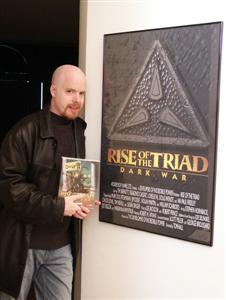
|
|
Tom in 2003.
|
10) If you're no longer making games, have you thought about returning to this industry? If not, why not?
N/A
11) Looking back, are there any missed opportunities that you wish you'd have jumped on?
No, it's been a pretty good ride. Wish I had the rights to Keen and Anachronox, but I've tried to stay creatively happy throughout my career, and have pretty much done that.
12) Other than your game(s), what's your favorite game released or produced by Apogee (or 3D Realms)?
Other than our stuff, Duke Nukem 3D is still the best from that studio. Really fun.
12a) And what's your favorite 2-4 games released by anyone else?
Chrono Trigger (SNES), Wizardry I (Apple ][), Ultima III (Apple ][), Half-life 2 (PC), Day of the Tentacle (PC), Secret of Monkey Island I & II (PC), um... oh wait, you said 2-4. Did I mention Sneakers (Apple ][)? Ape Escape (PSX)?
13) Is there anything else you'd like to add about your time here or to fans of your title(s)?
See, a bunch of folks can just get together, make the type of games they love and come out with fun, popular stuff! And dudes, finish Duke this year. Really. Ya might, I dunno, put a milestone schedule together, maybe something in Project. Just an idea.
Just kiddin'! We all want to PLAY it! Quit hoggin' it, man!
And to the fans... really, thanks for playing the dumb little games me and my buds have been making in a little room somewhere. What an odd job this is!
Thanks!
 Tom with George and David Gerrold when David visited the 3DR offices in 1995.
Tom with George and David Gerrold when David visited the 3DR offices in 1995.
Thanks to Tom for helping out with the interview series. You can read more about Tom's life on his website. Additionally, we still sell all the games he worked with during his time with us (Commander Keen, Wolfenstein 3D, Rise of the Triad, Terminal Velocity, etc...) so make sure and check them all out on our Games Page.
Make sure and tune in again next Monday morning, when we bring you the next in our Legacy Interview series.
Posted by Joe Siegler at 12:04 PM
| Discuss this story on our forums
|
 |
 |
 |
 |
 |
Prey Weekly Development Update #3
Hi and welcome to the third entry in the Prey Weekly Update series. This entry will be a little different than the ones that preceeded it. This will detail some of my experiences on the press trip for Prey this past week via a couple of journal entries I made during the week - it got pretty hectic there, so there isn't a report every day, but I think most everything got covered. Enjoy!
Jan 23rd, 11 PM
Well, I arrived in Los Angeles this morning to a very welcome climate change. It's damn cold in Wisconsin (although, it has been an unseasonably warm winter. Still, it was like 20 degrees when I left). A lot of driving today. LA is too damn huge. I'd assume lots more driving tomorrow, too.
Today was a fairly busy day of demoing. The first few demos are always the most chaotic as it takes a couple of demos to get into the groove. I usually elicit enough feedback from the first few demos to shape the demos for the rest of the trip.
Today was also the first time that someone not working on the game (or testing for us) has played the multiplayer. Very cool to see people’s reactions to the gameplay in MultiPrey. They picked up the mechanics of the game very quickly - I had expected them to take longer to understand wallwalk and gravity flipping, but they were running around the levels like champs within just a few minutes.
Jan 24th, 11:30 PM
Another long day today. Didn’t have as many demos today (although I looked at the schedule and the next two days are going to be action-packed when I get to San Francisco).
Two demos this morning, which went very smoothly. The game pretty much shows it self off now. The levels are so packed full of stuff that it’s really easy to simply walk through the game and point out all the features that set Prey apart.
I was a guest on Attack of the Show today. While I haven’t yet seen the footage of the episode, it felt like it went well. We showed some live footage of the game being played as well as some footage of multiplayer in action. If I had to complain, I would only say that the segment went really fast - I wish I had more time to talk about the game!
Overall, a good experience. Big thanks to everyone involved in the show. I look forward to seeing the footage of the episode.
Flew into San Francisco today. This part of the tour is slightly different in that the journalists will be visiting us in our hotel suite. So, tomorrow morning we need to set up the machines and get everything ready.
Jan 27th, 7 AM
Set-up yesterday morning took a bit longer than we expected as we ran into some issues with a couple of the machines. Unfortunate, but that meant that we had fewer systems for the multiplayer demo than previously expected.
The demo consisted of three parts: We showed a portion of the single-player game, showed a short bit of the 360 version in action, and then a hand-on demo of Prey multiplayer deathmatch.
Nearly all the features in singleplayer (wallwalking, gravity flipping, spiritwalking, the vehicle, etc) show up in multiplayer. When designing the maps, we ran into issues where the levels became really dense and chaotic due to all of these gameplay elements. Eventually, we decided to selectively emphasis elements in each map. So, for instance, we have maps that focus on wallwalking and other maps that focus on flying around in vehicles.
We showed the journalists three of the multiplayer maps, each based around different Prey gameplay: wallwalking, gravity flipping, and spherical gravity (where the combat takes place on giant spheres). Lots of swearing and smack-talk around the table. Again, very interesting to see how quickly they picked up on the design of the maps and the mechanics of the gameplay.
Overall it was a great time, and we managed to pack in a lot of demos in a short period of time.
Now, I’m looking forward to going home and getting back to work!
Chris Rhinehart - Prey Project Lead
Human Head Software

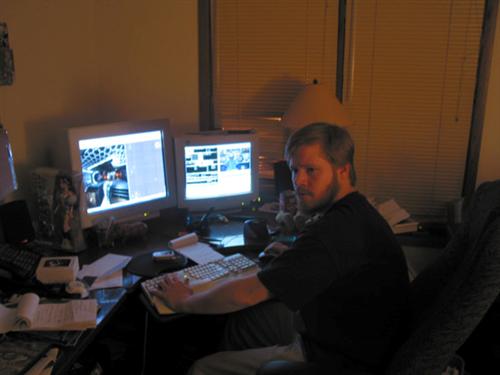
Level Designer Dave Halsted hard at work with the Preditor.
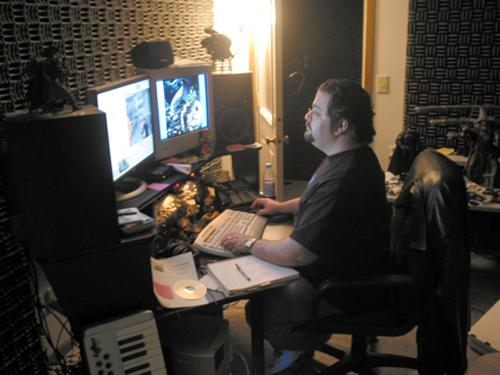
Sound Lead Ed Lima working on the copious amounts of audio for the game.

Click the screenshot to watch Prey in action on the videos page!
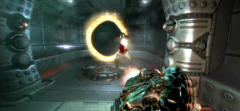

Additionally, if you are a gaming news website, and wish to be updated directly with notification of these updates, please email us with a link to your website and a request to be added, and we'll email you with the next update.
Posted by Joe Siegler at 11:58 AM
|
 |
 |
 |
 |
 |
Prey to be on G4's Attack of the Show
As was mentioned in last Friday's Prey Weekly Update, Chris Rhinehart will be on G4's "Attack of the Show" with Prey. Well, as promised, we have some scheduling information for that. According to the G4 website, the episode will air tomorrow, January 24th at 7PMET/PT here in the US. Here's some info from G4's website on this specific episode (which also gives some repeat episode times as well).
Filmmaker Cory Welles, director of The Story of the Original Cannonball Run, drives in, and Chris Rhinehart from Human Head Studios swings by to demo the game Prey on the PC. Plus, Chris Gore's got DVDuesday, Wil O'Neal's bringd the Homeboy Network, and don't forget It Came from eBay!
Make sure and tune in to catch Chris on the show. We do not have specific information as to what time he will be on, but make sure and check it out to see some new Prey goodness.
Posted by Joe Siegler at 5:10 PM
|
 |
 |
 |
 |
 |
The Apogee Legacy #3 - Karen Crowther
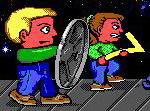 Today we bring you the third in our "Apogee Legacy" Interview series. This week we speak with Karen Crowther (now known as Karen Chun), the author of the only two educational games in our product line. These are Word Rescue, and Math Rescue, both released in 1992. These are the only titles in our line she was involved with directly, but she's been a friend to the company for awhile now. Additionally, she's the only female lead game designer we've had. We've had other women work for us, or on our titles, but she's the only lead designer we've ever had. Today we bring you the third in our "Apogee Legacy" Interview series. This week we speak with Karen Crowther (now known as Karen Chun), the author of the only two educational games in our product line. These are Word Rescue, and Math Rescue, both released in 1992. These are the only titles in our line she was involved with directly, but she's been a friend to the company for awhile now. Additionally, she's the only female lead game designer we've had. We've had other women work for us, or on our titles, but she's the only lead designer we've ever had.
So without further delay, we take you to Hawaii for our interview with Karen...
The Apogee Legacy
Past Pioneers of the Shareware Revolution
Issue #3 - Karen Crowther-Chun
1) How did you first come in contact with Apogee?
I was a fanatic Commander Keen and Duke Nukem (sidescroller) player. I love those games and still think they're the best. (And I really miss Tom Hall and his wacky sense of humor...hey, Tom, you need to visit me in Maui!!!)
Dang! My mind is going...I know Scott and I were involved in a lot of political stuff (fighting off government regulation of computer games etc. with Diana Gruber and Rosemary West - hammering out the role of shareware and making sure the authors didn't get ripped off by the retail publishers) but I think that came later.
2) Was there a reason you decided to work with Apogee, say versus going on your own or working with another company?
First, I really liked Scott Miller. He put me in touch with Todd Replogle (Duke Nukum) who helped me with some programming issues. If no one else tells you, Todd is a really great guy and pretty humble considering what a good programmer he is. Scott helped me with PC sound effects and cool ideas. And I loved interacting with George Broussard. When Joe Siegler came along, he was a lot of fun too. I think that Scott is a marketing genius.
3) Looking back, was there anything Apogee could have done better, regarding the marketing and distribution of your game?
Apogee did a great job for me. They basically let me do anything I wanted and made me a millionaire (well, started me on the way, at least). I have nothing but good stuff to say about them.
 4) Do you think your game was made better or worse by working with Apogee? 4) Do you think your game was made better or worse by working with Apogee?
Well, better, of course! When I listened to Scott, my games got better. That's why the games I distributed through Apogee are the most successful. Although Pickle Wars (distributed through another company) did become a cult classic with game developers, it never made much money despite what I think was some pretty fantastic music by Bobby Prince. So, in retrospect, I can say that Scott's instincts were right on. The games that I was paid beaucoup bucks to produce for big name retailers are dead, dead, dead now. The Apogee games (Math and Word Rescue) are still going strong.
5) Apogee had a policy of letting the designer or studio retain full intellectual property rights to their game. Nowadays, it's rare to find a publisher who allows this, especially if the publisher is providing the funding. Do you believe that it's best for the creator to retain IP rights? Why or why not?
I liked the fact that I retained the rights because I had fun wheeling and dealing. However, knowing what I know now about the way that big retail publishers can mess up, I'd probably have left more of the decision-making in Scott's hands. He has the clout to make them keep their contractual promises. But you know, at that time, we were
all winging it and learning by doing. I can say for certain, that I made more money through Apogee than any other publishers.
5a) Do you think there'll ever be a sequel to your game(s)?
I have so many people asking me to update my games to Windows. I start doing it and then I get "Polynesian Paralysis" (e.g. you start working and then you decide to go to the beach instead). Plus I absolutely HATE Windows programming. Now that I'm getting into Java and PHP programming, I might make web versions....but then again, I might go surfing instead :-)
6) Is there any story/incident that stands out as interesting during your time associated with Apogee?
No response to question.
7) Apogee was an early pioneer in terms of teaming up with external designers and studios, and continues to do so even to this day (currently working with Human Head Studios on Prey). Why is it that so few other studios do this (mentor and fund outside projects with lesser known teams)?
I tell you, my experience with big game companies is that they are by and large run by idiots. That's why. They're the typical corporation where some guy with a great line of BS comes in, dazzles the clueless bosses and then makes life difficult for the programmers, artists and so on because all he wants is a raise and promotion. Meanwhile he has no common sense and no love of the games and the things that those of us who make games value (like cool programming and having fun).
8) What the biggest difference in the industry nowadays versus when you worked with Apogee?
When I created my first games for Apogee, it was just me and the artist, doing it on spec. Nowadays the look and feel is so expensive, you need at big bucks and it is much more difficult to do a complete game on your own while your working at a day job. I still think that the Internet (in our days, BBS) is the key to new people getting started. But the retail (store shelf) arena is locked up by a few big companies.
9) What have you been doing since your time with Apogee?
I moved to Maui and started paddling outrigger canoe. I'm such a fanatic that I actually coached at 2 clubs here on Maui and have been racing...doing the 41 mile Moloka'i to 'Oahu channel race (7 hours of paddling) a couple times. I design and build houses, do webpages - some for money and some (like the Maui Sierra Club website) to give back to the world that has been so good to me.
I've always been into my kids and now I have a granddaughter (who also paddles outrigger canoe). Every morning I wake up and say to myself, "Dang, I'm living in paradise!".
10) If you're no longer making games, have you thought about returning to this industry? If not, why not?
I'm starting to get a little bored. Now that I've figured out how to make CSS and Java games, I'll probably do some small web games. I took a break for a while because I hated Windows so much. When I programmed my old games, there were just a few instructions (a tiny set of C instructions and the DOS interrupts) so you could program just about anything by being clever. Then along came Windows with API docs bigger than the San Francisco phone books! I'm not good at memorization and programming just wasn't fun anymore.
11) Looking back, are there any missed opportunities that you wish you'd have jumped on?
Not really. I had a lot of fun, got to do exactly what I wanted (be with my kids, make games, go to Maui, build houses). I had the opportunity to become more of an administrator and have Redwood Games become a big company, but I found that I didn't enjoy being a supervisor so I just took an abrupt U turn and ditched that whole scene. I like the hands-on part. In fact, I think that was the most important strength of the Apogee business model...it let people like me do exactly what we wanted to do which was the hands-on stuff and have the creative control while getting help and feedback from Scott and his team.
12) Other than your game(s), what's your favorite game released or produced by Apogee (or 3D Realms)?
That is really, really hard. It's a tie between the side-scroller Duke Nukem and the old Commander Keen games. Also I liked Blake Stone and the early 3D games.
12a) And what's your favorite 2-4 games released by anyone else?
Well nothing was as fun as the side scrollers but I really like William Soleau's puzzle games. (You can tell I am stuck back in the early 90's ;-) )
13) Is there anything else you'd like to add about your time here or to fans of your title(s)?
A big thank you to those who enjoyed my games and for continuing to enjoy them. I'm getting people now who played Math and Word Rescue when they were kids, buying the games for THIER kids. I really value the emails I get from players of my games. It gives me a real lift to know that folks appreciate what I created.
Thanks to Karen for agreeing to help out with the interview series. You can read more about Karen's life on this page at her site. Additionally, we still sell Math & Word Rescue almost 14 years after they were originally released, make sure and visit these pages for more information on them.
Make sure and tune in again next Monday morning, when we bring you the next in our Legacy Interview series.
Posted by Joe Siegler at 12:36 PM
| Discuss this story on our forums
|
 |
 |
 |
 |
 |
Prey Weekly Development Update #2
Welcome to the second edition of the Prey Weekly Development Update. Last week, we talked about the history of the game. This week we're talking about some cool stuff going on with the game and here at Human Head. Lots to discuss, so let's get to it:
Head Trips: Prey Press Tour
Next week, a whirlwind press tour is planned for Prey. It's divided into two phases: American press and European Press. I'm headed to Los Angeles and San Francisco next week for the American press, and Tim Gerritsen is flying to Europe for the (surprise) European side of things. Both print and online press will be there - too many to list here (plus I wouldn't want to miss anyone and have them punch me in the neck when they see me in person).
The press will have the chance to see about 30 minutes of single-player action. For this demo, we're focusing on the earlier portions of the game - letting them see how the game ramps up in combat, puzzles, and the player's abilities.
After the single-player portion, we're going to play some MultiPrey deathmatch to give them a feel for that side of the game. We've picked out three maps for them to play - one that focuses on wallwalking, one that focuses on gravity flipping, and one that is all about spherical gravity (fighting on small planetoids). I'm looking forward to their reactions as those elements can be confusing at first, but most of our in-house testers have picked them up quickly.
The multiplayer has really come together - the weapons feel very balanced and nearly all the gameplay from the single player is available in multiplayer: spiritwalking, gravity flip, vehicles, and so forth. The only major gameplay element not in multiplayer is DeathWalk - and that was removed because it was more fun to simply respawn quickly so you can exact revenge upon the chump who killed you.
Also, I'm going to be a guest on Attack of the Show (airing on G4) next week. We'll be discussing Prey and will also probably show off some brief clips of the single player in action. Watch for it!
Deep Inside the Human Head:
This has been an especially busy week here at Human Head. Here's a brief peek into each department's recent tasks:
Programming: The programmers have been cranking on bug fixing, optimization, and working with things such as the installer and localization files (which are essentially a large file containing all the text in the game which is then translated into other languages).
Also, AMD was here helping out with game optimization for a few days this week. Big thanks to them for their help.
Here is this week's NASTY BUG OF THE WEEK*: Occasionally while playtesting multiplayer, the whole game would grind down to a halt for a few seconds before going back to normal. Crack programmer Rich Whitehouse tracked this down to an issue where one of our weapons (the three-legged crawler grenade) was causing some serious issues when it was thrown onto a switch that controls the direction of gravity.
* note that nasty bug of the week is not actually a weekly feature.
Level Designers and Level Scripters: The level designers and the scripters have also been very busy fixing bugs and tweaking parts of the levels. The tweaks range from simple lighting/texture tweaks to larger script tasks such as an ammo respawn system for boss battles.
The level designers were also charged with the task of taking single-player screenshots for the press tour next week. Screenshots are a difficult beast, because it's very tough to convey how cool the environment and creatures feel in motion just from a single static shot. As such, the designers spend hours in the game taking tons of shots - of which maybe 2 or 3 are up to the quality we want. Even though it seems like it should be simple, it's actually a very difficult job (and probably the bane of their existence).
Sound: The sound department has been working on last minute sound integrations and tweaks. Sound in games is similar to sound in movies; many sounds simply can't be done until really late in the project. Now that things such as animations and scripted sequences are getting finalized, the sound designers can go through and tweak everything without fear of having to redo work if the puzzle changes.
We've also received music from Jeremy Soule and we're integrating it into the game. We may show some progress of this sometime soon as it's very interesting to see how music changes the feel of the game and really brings out the mood in certain sequences.
Artists: The artists are still transitioning from art creation to playtesting. There's still a good chunk of art being finalized and tweaked. Despite that, many of the artists are spending their time playing through the game, looking for bugs, and giving feedback on the game balance.
Animation: The animators are reviewing all of the motion capture data we received from Red Eye, and are implementing it into the game and critiquing it and sending back the files we want updated.
So, to summarize: Tweak, polish, bug fix, repeat until When it's Done.
Well, that's it for now. Next week I'll be updating from the road (as I'll still be in San Francisco). I'll definitely be talking about my experiences on the press tour, maybe talking a bit more about the music in Prey, and a few other interesting things we haven't mentioned here yet.
Chris Rhinehart - Prey Project Lead
Human Head Software


Here is scripter Mike Flynn showing level designer Jason O'Connell a bug with one of the maps.

Click the screenshot to watch Prey in action on the videos page!


Additionally, if you are a gaming news website, and wish to be updated directly with notification of these updates, please email us with a link to your website and a request to be added, and we'll email you with the next update.
Posted by Joe Siegler at 12:11 PM
|
 |
 |
 |
 |
 |
The Apogee Legacy #2 - Keith Schuler
 Last week we started a new series on our website about some of our developers from the past. We called this series "The Apogee Legacy Interview Series". In our first edition, we brought you an interview with Jim Norwood. For the second edition, we are bringing you an interview with our own Keith Schuler. Keith has been involved with us for a very long time, and continues to do so to this day. His first project with us came out back in 1991 (Paganitzu), and then he went through Realms of Chaos, the aborted Duke Nukem Forever scroller game, as well as Duke Nukem 3D Atomic Edition, Shadow Warrior, and now Duke Nukem Forever. Last week we started a new series on our website about some of our developers from the past. We called this series "The Apogee Legacy Interview Series". In our first edition, we brought you an interview with Jim Norwood. For the second edition, we are bringing you an interview with our own Keith Schuler. Keith has been involved with us for a very long time, and continues to do so to this day. His first project with us came out back in 1991 (Paganitzu), and then he went through Realms of Chaos, the aborted Duke Nukem Forever scroller game, as well as Duke Nukem 3D Atomic Edition, Shadow Warrior, and now Duke Nukem Forever.
So without further delay, we bring you the tallest developer in our history, Keith Schuler...
The Apogee Legacy
Past Pioneers of the Shareware Revolution
Issue #2 - Keith Schuler
1) How did you first come in contact with Apogee?
I had seen Kroz games in shareware catalogs and other places, so I was familiar with the name. Big Blue Disk published one of my earliest games, Chagunitzu. About a month later, they forwarded a fan letter to me. It was written by a little boy, and he wanted to know what my high score was at Chagunitzu. I thought it was an odd question, but I couldn't ignore my fan, so I wrote a letter back to him.
Shortly thereafter I got a phone call from Scott Miller. He explained that he had written the fan letter so that he could contact me without raising suspicion at Big Blue Disk. Apparently he had been approaching other developers there, as well. Scott thought that Chagunitzu would work well as an episodic game, and he wanted me to write a sequel trilogy, to be published by Apogee.
2) Was there a reason you decided to work with Apogee, say versus going on your own or working with another company?
Scott mailed me some of the current projects that other devs at Apogee were working on, like Monuments of Mars and Commander Keen. Commander Keen, in particular, completely amazed me. After seeing such groundbreaking games (and getting an unsolicited check for $50) I was convinced that Apogee was the team to play for. It was certainly an improvement over my two current jobs: Burger King and my father's lawn mowing service (for which I was not getting paid.)
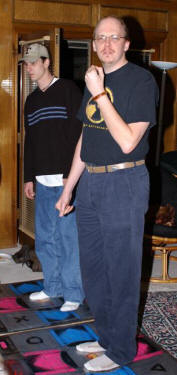 3) Looking back, was there anything Apogee could have done better, regarding the marketing and distribution of your game? 3) Looking back, was there anything Apogee could have done better, regarding the marketing and distribution of your game?
With regards to Paganitzu, I don't think anything could have been done better. It was still selling long after many other Apogee games had retired. With Realms of Chaos, I don't think anything could've been done to save it. Like other 2D games at the time, it was stillborn into the post-Doom era.
4) Do you think your game was made better or worse by working with Apogee?
Definitely better. George and Scott absolutely excel at taking a game and polishing it to perfection. It's what they do best, in my opinion.
5) Apogee had a policy of letting the designer or studio retain full intellectual property rights to their game. Nowadays, it's rare to find a publisher who allows this, especially if the publisher is providing the funding. Do you believe that it's best for the creator to retain IP rights? Why or why not?
They did? Crap, I don't think I own the IP for my two games. Or do I? I don't know, I'd have to ask. I don't have a clearly defined answer to your question. Best for who? It is best for the creator to own the IP when it is strong, and he can leverage that strength to put himself in a better position with the publisher. That doesn't guarantee a better game, though, so what's best for the creator might not be best for the player.
5a) And if applicable, have you benefited from retaining ownership of your own IP?
If applicable, no. The Paganitzu and ROC IPs are not strong enough to matter, anyway.
5b) Do you think there'll ever be a sequel to your game(s)?
I still want to make a sequel to Paganitzu. Something that runs under Windows, is mouse driven, with updated sound and graphics, and gameplay that is more fair and fun. Unfortunately, these things take time, and I'm not a teenager living with my parents anymore. That's not even considering whether Apogee/3D Realms would want to publish it. And, assuming they didn't, IP ownership and non-compete issues might be a problem. I haven't looked into it, since it's not even close to being an issue right now. Duke Nukem Forever and parenting take up all my time.
6) Is there any story/incident that stands out as interesting during your time associated with Apogee?
The way Scott Miller contacted me is probably the most interesting story. Other than that, there was the time I was in limbo after completing Realms Of Chaos. George tried letting me produce some external titles (including the original, side scrolling Duke Nukem Forever), but those projects were all dropped shortly after Duke 3D came out. I finally talked them into letting me move to Dallas and becoming an internal employee, although it was unclear what I would be doing. When I got here, the guys who would eventually become Ritual had just left, and the remaining guys were working on the Plutonium Pak. I picked up the Build editor and made a little Duke 3D map of my own, just trying out the different features. When George saw what I'd done, he made me a level designer on Plutonium Pak. The rest is history.
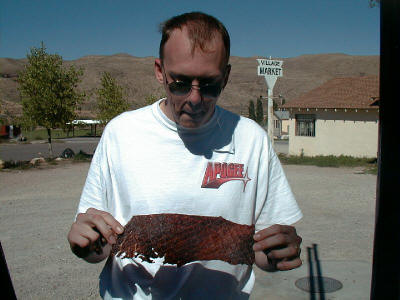
7) Apogee was an early pioneer in terms of teaming up with external designers and studios, and continues to do so even to this day (currently working with Human Head Studios on Prey). Why is it that so few other studios do this (mentor and fund outside projects with lesser known teams)?
I think Apogee is in a unique position. They are financially independent, yet still have enough money to fund outside projects. And, like I said above, George and Scott excel at producing polishing games to perfection. Max Payne showed that the process could succeed. If Prey also succeeds, that will prove it wasn't a fluke. The repeated successes may encourage other studios (and possibly publishers) to take similar risks. Who knows? In the future we may actually see production houses that have no internal projects at all, but exist only by funding external projects and acting as liaison between the developer and the publisher.
8) What the biggest difference in the industry nowadays versus when you worked with Apogee?
Everything's bigger. Dev teams number in the hundreds, in some cases. Games have much higher production values and require much longer to create. Gone are the days when a guy like me would create an entire game by himself, in less than a year. Now you have James Bond games starring the actual film actors. Sports games have all the sports stars. Now, movies are being made based on games, instead of only happening the other way around. (Of course, they aren't *good* movies.)

|
|
Keith dressed up as Alabama Smith from his Paganitzu game.
|
9) What have you been doing since your time with Apogee?
Working on Duke Nukem Forever.
10) If you're no longer making games, have you thought about returning to this industry? If not, why not?
N/A
11) Looking back, are there any missed opportunities that you wish you'd have jumped on?
I wish I'd started my IRA a lot sooner than I did.
12) Other than your game(s), what's your favorite game released or produced by Apogee (or 3D Realms)?
Duke Nukem 3D
12a) And what's your favorite 2-4 games released by anyone else?
Robotron, Ultima Underworld: The Stygian Abyss, System Shock 2, & Thief 2
13) Is there anything else you'd like to add about your time here or to fans of your title(s)?
Follow your dreams. You can reach your goals. I'm living proof. Beefcake! BEEFCAKE!
 Keith with his wife Rose (who was the voice of the Anime Girls in Shadow Warrior)
Keith with his wife Rose (who was the voice of the Anime Girls in Shadow Warrior)
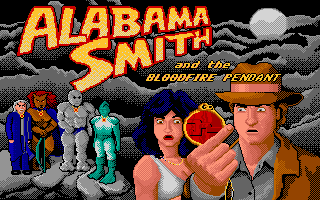 Title screen from early beta of Realms of Chaos when it had a different title.
Title screen from early beta of Realms of Chaos when it had a different title.
A special thanks to Keith for agreeing to help out with the interview series. Keith's two projects are still available for sale from us, if you'd like to check them out, make sure and visit these pages for more information on them.
Make sure and tune in again next Monday morning, when we bring you the next in our Legacy Interview series.
Posted by Joe Siegler at 2:20 PM
| Discuss this story on our forums
|
 |
 |
 |
 |
 |
Prey Weekly Update #1
Welcome to the first installment of the Prey Weekly Update! We'll be updating this every week with juicy information about Prey and about the development behind the game. We'll be talking about anything interesting that's happened over the past week -- whether it is some new cool feature we've put into the game, or a milestone that has been reached. We're also planning some cool special features, talking about some cool highlights during the game's development. Hey, and you might even hear some interesting news about DNF from me, but probably not. :)
First, a brief history of the game since Human Head has been working on it. For a full history of Prey, check out Lon Matero's excellent Prey history page here.
Human Head started working on Prey in May 2001. We had recently finished Rune and were looking for our next project. George and Scott from 3D Realms enjoyed Rune quite a bit, and wanted to work with us on something. Prey seemed like an interesting project to resurrect.
3DR was interested in maintaining a few key elements from the original Prey design, specifically the main character (although he underwent a name change) and some elements of the plot. They gave us the freedom to rework the weapons, creatures, and levels. So our initial tasks were working with 3DR on the story and brainstorming the various features of the game.
For years, we worked on implementing our design. We went through a lot of visual iterations on creatures and levels, reworking things and throwing things out until we achieved a look and level of quality that we were happy with.
The design underwent many changes as well - mostly being streamlined into simpler systems. For example, originally Tommy had seven different spirit powers that he would gain through the game. We were concerned that the powers wouldn't be fully used, so we simplified the design to a single power: SpiritWalk. Eliminating the other powers allowed us to concentrate more heavily on SpiritWalk, and also simplified the control of the game (since a single button is needed for SpiritWalk instead of an inventory system for multiple powers).
Fast forward to May of 2005. E3. Our first public unveiling of the game. PC Gamer released an exclusive story announcing Prey. The rumors flying around were finally validated.
At E3, we showed off a 12-minute video highlighting the new gameplay we implemented in Prey. Gearing up for E3 was quite an ordeal. We knew which areas we wanted to show and roughly how to show them. It was an incredible crunch getting things ready for the first public showing -- so many things needed visual and audio polish. The programmers were crunching to get the demo playback robust and optimized.
The demo worked by recording our control input, which was then used during a real-time playback of the game. As such, we had to have perfect recordings -- Mike Flynn and I spent hours upon hours recording sequences of the game. One of the sequences was recorded over 200 times before we finally got the one we wanted. It was worth it -- response from the E3 video was overwhelmingly positive.
Expect to see much more press and previews on Prey over the next few months, as we finally start to unveil more details about the game, including information on MultiPrey, and information about the Xbox 360 version.
So just what the hell has been going on lately at Human Head? Prey is completely playable from start to finish. The team has been crunching on bug fixing and optimization. The testers have been finding tons of little bugs here and there -- ranging from clipping issues to creatures not behaving correctly, to an incorrect piece of art. Those bugs are typical for this stage in the project and we're diving in to fix these problems.
We have a major press event coming up at the end of this month. I'll be flying out to L.A. and San Francisco to demo the game for several different magazines (both print and online). Some of them will probably even get some hands-on time with the game. Tim Gerritsen (Human Head Biz Guy and internal Prey Producer) is flying out to Europe to cover the press there. More information about whom we'll be seeing will be released in the next couple of weeks.
Despite this crunch, we found the time to wander out into the snowy wasteland here in Wisconsin a few weeks ago to snap this Prey team photo. Ladies, some of these guys are single, if you find any of these guys overly handsome just drop me a line and I'll set you up with them.
And, here are a few of the topics I'll be covering over the next few weeks in this weekly update series:
- Voice Recording: Several months ago we recorded all the voice acting in the game. I'll be talking about the process of voice acting, how it went for Prey and put up a bunch of behind-the-scenes pictures of the session, and maybe even put up a few audio samples of the session.
- Motion Capture: Prey uses motion capture for many of the humans in the game, but not the monsters (If anyone knows how to motion-capture a giant four-legged half-alien monster, please let me know). This was the first time that Human Head had used motion capture in our projects, so I'll talk about that process, and a few of the things that went right and wrong.
- Focus Testing: I'll take you behind the scenes on how we do our internal focus testing for both single and multiplayer.
Anyway. My Prey to-do list is still huge, so I need to get back to it. Until next week....
Chris Rhinehart - Prey Project Lead
Human Head Software
Posted by Joe Siegler at 12:00 PM
|
 |
 |
 |
 |
 |
Prey 360 Video on Xbox Magazine Disc
 Back in mid november we brought you the news (here and here) of the appearance of the Prey for the Xbox 360 teaser trailer. That video has been available online for awhile now, but if you were one of the folks who missed it for one reason or another, you have a new medium to check it out in. Back in mid november we brought you the news (here and here) of the appearance of the Prey for the Xbox 360 teaser trailer. That video has been available online for awhile now, but if you were one of the folks who missed it for one reason or another, you have a new medium to check it out in.
Hitting subscribers shelves now is the February 2006 issue of "The Official Xbox Magazine". Each month this magazine comes with a disc that contains playable demos, videos, and more for various Xbox games. Now that the 360 is out this disc is dual purposed, it contains Xbox 1 & Xbox 360 content. The February 2006 edition of the disc (which calls the video "gorgeous") has the trailer video for Prey 360 on it. If you already subscribe to this magazine, then you'll want to check it out when it hits your mailbox. If you don't subscribe, and you want to check it out, it should be on newsstands as well.
Or you can visit this link at Fileshack to downlad a copy for yourself.
Posted by Joe Siegler at 9:30 PM
|
 |
 |
 |
 |
 |
Prey grinds those Gears
Prey is better than Gears of War? That's what IGN seems to think in their "2006 Predictions". IGN is referring of course to CliffyB's "Gears of War" due later this year for the Xbox 360, saying "Prey will steal Gears of War's glory in the end." Here's what IGN has to say about Prey in this article:
We've all seen the Gears of War coverage so far. It's almost impossible not to have, considering it has been shown at almost every major Microsoft event in the last year. In it, you guide Marcus Fenix across the planet Sera as he battles ferocious Locust swarms. While the game has proven to be visually stunning so far, we're not really sure about its gameplay mechanics. It's been frequently described as "stop and pop" gameplay, but what that precisely means or how it will prove unique is unclear. Basically each level seems to proceed with players advancing to a hostile area and taking cover behind cars and ruined structure while occasionally popping out and unleashing a few bullets. Does that really sound revolutionary?
While you're thinking about that, consider Human Head Studios and 3D Realms' Prey, a first person shooter with a few very interesting features. Prey lets you control Tommy, a Cherokee who's had his girlfriend stolen by a mysterious alien force. From what we've seen so far, the game takes place aboard the alien craft with a distinct biomechanical flavor. Much like in Gears of War, you'll face off against freakish alien creatures. Unlike Gears of War, you'll have a variety of unique ways to dispatch them. In many of the game's environments you'll have to grapple with changes in gravity, as well as an entire Spirit dimension you can enter to perform stealth kills and access otherwise blocked areas. Though it's a first-person shooter, Prey is far from mindless, and may in fact prove to be more entertaining and more innovative than Gears of War hopes to be.
That's pretty high praise, as Gears of War has been getting some good press. Head over to the IGN site to check out their entire 2006 predictions article today where they talk about other game possibilities such as Grand Theft Auto 4, Knights of the Old Republic 3, and more.
Posted by Joe Siegler at 12:09 PM
|
 |
 |
 |
 |
 |
The Apogee Legacy #1 - Jim Norwood
The Apogee Legacy
Past Pioneers of the Shareware Revolution
Issue #1 - Jim Norwood
Today we lead off a new regular section on our website. Apogee Software has been around since 1987, and while we changed the name we're generally known by (to 3D Realms), the origins of the company are in the name Apogee. We were involved with many developers back in those days. Some of these folks have gone on to bigger things in the game industry. Some are not working in the industry at all anymore. But we've sought out as many of our old developers that we could locate (some of which we haven't had any contact with in a decade) for an interview series based on their time working with us. It's been fun talking to these folks about their time with us, and we hope you enjoy this insight into the developers who helped found what our company is today.
This series will be a regular thing on our website, with a new interview appearing each Monday for you to check out. This first edition of the series is with Jim Norwood. Jim was involved with two projects with us, 1993's Bio Menace, 1997's Shadow Warrior, and assisted on a whole scope of other projects from back in those days such as Duke Nukem, Secret Agent, & Wolfenstein 3D among others. Bio Menace was also recently released as freeware, so we thought that would be a good starting point for our interview series..
1) How did you first come in contact with Apogee?
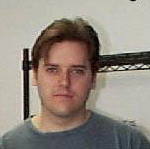 I was at the time, like many developers, 'doing my own thing'- just working on a 2D game in my spare time that was something I thought would be fun to play. My day job at the time was some boring dBase programming gig in the business sector working for Raytheon. At least I got to see Patriot Missiles up close and I had cool national security clearance, but those were about the only perks. I was at the time, like many developers, 'doing my own thing'- just working on a 2D game in my spare time that was something I thought would be fun to play. My day job at the time was some boring dBase programming gig in the business sector working for Raytheon. At least I got to see Patriot Missiles up close and I had cool national security clearance, but those were about the only perks.
At the time, I was making a side-scroller. Those were the popular games back then. I saw the Commander Keen engine from Apogee and was so impressed by how smooth John Carmack had gotten the scrolling in the engine, I naively just picked up the phone and called up Scott Miller at Apogee (yes, CEO's still had direct lines back then. Isn't that something?), and asked him if the source code to the Keen scrolling technology was also shareware. (Duh) Of course it wasn't, but that got Scott and I talking. When Scott also found out I was doing all the art for my own game, he became even more interested and asked me to send him samples of bitmap art I had been doing.
Well, after doing that, they liked my artwork and that landed me my first job in the game industry working on the original Duke Nukem 1 side-scroller doing background art. They even bought me a new PC to do the work on - I felt like a king. I was also given art tasks on various other games as well. In the mean time, I continued with my programming skills on my own, until eventually, we all went down to Shreveport, Louisiana to meet up with John Carmack, and the other ID folks, who by the way, were still working for SoftDisk at that time. They were not really ID just yet, not the way you'd know them now. By the way, just so you know - secretly, my favorite Id game is still Dangerous Dave. I just couldn't get enough of that shotgun. If you loved the shotgun in DooM, you owe a debt of thanks to Dangerous Dave for that!
So in the end, I got that Keen scrolling technology after all when I licensed the technology for my first solo game project, BioMenace, where I'd also be the game's only programmer, as well as the artist, and the designer, the level designer, and the sound engineer...whew! It was great fun, and I will always look back on those days fondly...but honestly, it was also a lot more work than one person should attempt on their own, even in those days.
2) Was there a reason you decided to work with Apogee, say versus going on your own or working with another company?
Apogee was the first company I had contact with and they gave me break into the game industry, which is what I always had wanted. And quite frankly, I didn't know anyone at any other game companies at the time.
3) Looking back, was there anything Apogee could have done better, regarding the marketing and distribution of your game?
Marketing and distribution weren't as big a problem as lack of development resources at the time. I needed a team to get things done before the game became too dated, even if I didn't realize it at the time. I think those early game projects might have been bigger hits if I had had a little help from some friends and put them out a year earlier.
4) Do you think your game was made better or worse by working with Apogee?
As opposed to working with who as an alternative? This is hard to quantify, but I feel that Apogee had a clear vision for what made great games at that time. Their early success proves that fact.
5) Apogee had a policy of letting the designer or studio retain full intellectual property rights to their game. Nowadays, it's rare to find a publisher who allows this, especially if the publisher is providing the funding. Do you believe that it's best for the creator to retain IP rights? Why or why not?
The man footing the bill wins. If a publisher pays for your development costs, he is the one taking all the risks, not you. I believe in that case, the publisher should retain the rights and not the developer. However, in cases where the developer makes the game and then approaches the publisher with a nearly finished product, the developer should clearly hold the rights instead. It's all about who is the one taking the most financial risks on the project. Those are the folks that should reap the most rewards. But you cannot have a hit game without a developer either, so being generous for a job well done is also warranted even if that developer does not retain property rights to his project. I've always felt this was a pretty cut and dry issue, but you'd be surprised at just how muddled development deals can become...
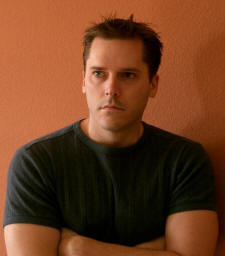
|
|
Jim in 2006
|
5a) And if applicable, have you benefited from retaining ownership of your own IP?
Hah! Of course I benefited! I got royalty checks for my first games for over ten years! Imagine getting a paycheck for ten year old work you did! Well, I did...on a monthly basis, until the sales finally just fizzled out from old age.
5b) Do you think there'll ever be a sequel to your game(s)?
No. We tossed around the idea a few times, but my projects were never big enough hits, mostly due to late release dates, that they do not have the following to merit a sequel. The comparison here would be to look at sales and popularity of Duke Nukem 3D vs. Shadow Warrior. Shadow Warrior has a following sure, but it's paltry compared to Duke.
6) Is there any story/incident that stands out as interesting during your time associated with Apogee?
A better question would be: are there any stories about my time with Apogee that don't stand out? I had a great time in my seven or so years with Apogee/3DRealms and met and worked with some of the greatest minds in the game industry today. What's not interesting about that? As you know, Id Software was affiliated with Apogee for a good while - so we all knew each other personally.
A very interesting story was the time we had to evacuate from George's house and run for our lives when a certain disgruntled developer who forgot to take his lithium came calling unexpectedly late one night, weapon in hand... I won't go in to details, but that certainly DID get one's blood pumping, and stands as a clear memory to this day. The police arrived to save the day, so we all survived the ordeal in the end.
7) Apogee was an early pioneer in terms of teaming up with external designers and studios, and continues to do so even to this day (currently working with Human Head Studios on Prey). Why is it that so few other studios do this (mentor and fund outside projects with lesser known teams)?
Is it true that other developers do not do this? Microsoft and EA are prime examples of large companies that work with smaller external studios. I work at EA, Redwood Shores now and we have plenty of external development houses helping out on various projects. (I cannot be more specific for legal reasons - sorry.)
8) What is the biggest difference in the industry nowadays versus when you worked with Apogee?
Size. It's bigger, it's more mature. The stakes are higher, the projects monolithic, the competition more fierce than ever... The game industry is for the 'big boys' now. It's moved into a multi-billion dollar industry and the little guys either get assimilated, or destroyed if they resist (sorry for the obvious geeky reference there). Or they just plain run out of funding because they cannot compete with the quality of projects that really large game companies are capable of now.
 Jim looking thrilled at having his picture taken.
Jim looking thrilled at having his picture taken.
This was Jim's desk at 3D Realms HQ in 1997.
9) What have you been doing since your time with Apogee?
Making more games of course... I'm currently at EA as a software engineer.
10) If you're no longer making games, have you thought about returning to this industry? If not, why not?
I don't plan on ever NOT making games - when some guys in white coats from the geriatrics ward arrive at my desk to take me away, that's when I'll be done with the game industry.
11) Looking back, are there any missed opportunities that you wish you'd have jumped on?
Id Software offered to hire me on to work on Doom 1 and help me finish BioMenace in the bargain. I declined their generous offer at that time for various reasons. But getting BioMenace done faster would have been a boon, and missing the chance to join Id? Well... need I say more? We don't always make the best choices in life since we might be blinded by other factors at that time. As they say, hind sight is 20/20.
12) Other than your game(s), what's your favorite game released or produced by Apogee (or 3D Realms)?
Duke Nukem 3D. That game kicked ass - period. Dudes - where is Duke 4!? Huh huh?
12a) And what's your favorite 2-4 games released by anyone else?
X-COM 1, Doom 2, No One Lives Forever (series), any game having to do with the WarCraft franchise (I'm currently addicted to World of Warcraft), and ALL BioWare games. (I admit it - I'm a shameless BioWare camp follower).
13) Is there anything else you'd like to add about your time here or to fans of your title(s)?
Sure - figure out how to revamp the Apogee line by creating next-gen side scrollers! It's the 3D revolution, but I'll never stop being a fan of the side-scroller genre. I'm convinced it can still be beautifully done with current generation technology, but most companies, if not all, won't take the marketing risk.
Also, to Frenkel, who created map images of all the BioMenace levels (link) - I thought that was great! My hat is off to you.
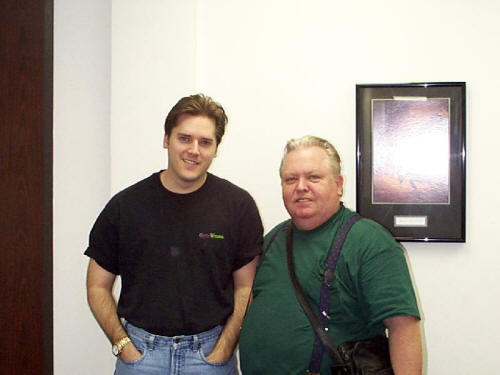 Jim with John Galt, the voice of Lo Wang in Shadow Warrior
Jim with John Galt, the voice of Lo Wang in Shadow Warrior

We'd like to thank Jim for his time in giving such a good interview to launch the series with. If you'd like to continue the trip down memory lane, you can check out the freeware release of Bio Menace, as well as information about Shadow Warrior, both of which are available on our website.
Please remember to tune in next Monday for the next interview in the Apogee Legacy Series.
Posted by Joe Siegler at 10:02 AM
| Discuss this story on our forums
|
 |
 |
 |
 |
|

 |
